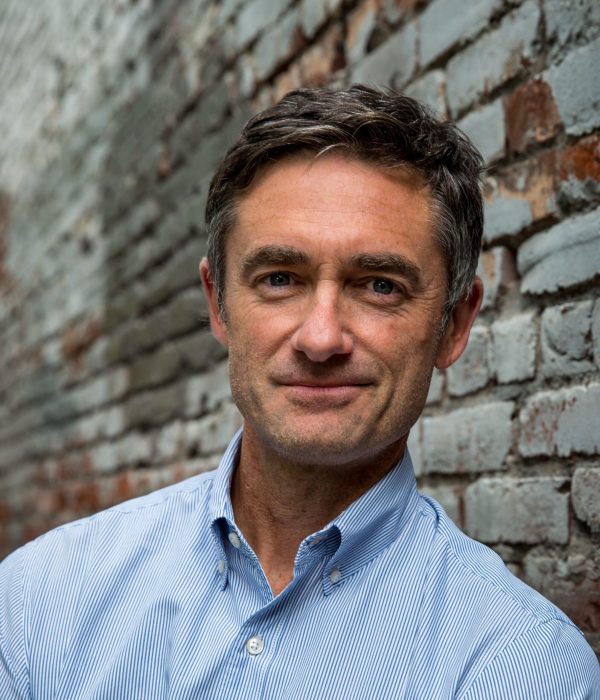
Executive Director
The peek of Seekseekqua (Mount Jefferson) reflected in Duffy Lake. Photo credit: Aimee Williams/Unsplash
Over the last six years, Executive Director Jeremy Barnicle has led Ecotrust in carrying forward a strong legacy and adapting to the most pressing challenges of the 21st century. On June 15, Jeremy will transition out of his role as Executive Director, but not without fond farewells. Below, Jeremy shares a reflection on the critical work of Ecotrust over the last three decades, and into the future.
I recently took a road trip through the southern part of the big, beautiful bioregion Ecotrust has served for more than 30 years. I am wrapping up my time as Ecotrust’s Executive Director, and I had lots of gratitude to share with friends and colleagues I hadn’t been able to see in person over these chaotic last few years.
What I saw on the road from Portland to Sacramento to the Bay Area disturbed me, though it didn’t surprise me. The town of Talent, Ore., which is one of the many places devastated by wildfire two years ago, is still recovering. Lake Shasta, which provides water for California’s Central Valley, is at about half the level it should be this time of year. Just the number of CAL FIRE vehicles I saw on the road this time of year reminded me of the number of lives and livelihoods that will be at risk if this fire season proves to be as devastating as the last.
The impacts of global warming are upon us, and never has the work of Ecotrust felt more relevant and urgent. When Spencer Beebe founded Ecotrust back in 1991, he emphasized that durable conservation could not happen without tying it to economic opportunity and anchoring it in bottom-up, place-based decision-making. We have to solve for equity and economic opportunity and the environment.
Here in the 2020s, the apex “conservation” issue is climate, and the twin-strategies of climate action—mitigation and adaptation—both require all hands on deck. At Ecotrust, we continue to work hard to demonstrate that natural climate solutions—particularly forest management—are a critical tool for keeping global warming in check, along with an immediate energy transition.
And I would argue that just about everything we do could be considered climate adaptation: how do we support communities in building resilience to the impacts that are already upon us? In collaboration with more than 160 partners, we are increasing regional resilience to a changing climate through centering the needs of and learning from the communities with whom we collaborate, partner, and serve. This work is central to Ecotrust moving forward: working for climate justice, building broadly shared wealth, and stewarding our lands and waters in a warmer, more volatile world.
We are now one year into our Strategic Plan, which I am very proud of having developed with our entire team and many of our key partners. In it, we make some big commitments, and I invite you to hold us to them. This Strategic Plan doubles down on a hybrid approach that has been unique to Ecotrust from the beginning. In addition to common non-profit tools like research and field-building, we deploy creative investment strategies that solve for a triple bottom line: real estate development, private equity, tax credits, lending.
“
As I reflect on my six years as Executive Director, one of things I am proudest of is the team and momentum we have built, despite an extraordinarily challenging last couple of years.
As unsettling as some of those recent road-trip scenes were, my interactions with our partners gave me hope: the “retired” conservation policy wonk who just won’t stop fighting for natural climate solutions throughout the American West; the foundation CEO who sees fixing democracy as central to addressing climate change and is putting her money where her mouth is; the Oakland city planner and activist who is advocating nationally for climate-smart and equitable transportation in low-income urban areas.
The team here at Ecotrust is bringing that same spirit of radical, practical change to our mission. As I reflect on my six years as Executive Director, one of things I am proudest of is the team and momentum we have built, despite an extraordinarily challenging last couple of years. Our team is larger, more geographically distributed through the bioregion, and more representative of the communities we serve than ever before. We are building the culture of belonging that our Strategic Plan envisions, including plans for the next phase of leadership here at Ecotrust that holds inclusive decision-making and power-sharing at its core.

With this vision in mind, I am so pleased to share that our Chief Impact Officer Olivia Rebanal and Chief Financial Officer Kevin Bumatay will be serving as Interim Co-Executive Directors of Ecotrust for the next several months while our board, with meaningful staff engagement, recruit permanent executive leadership. Olivia and Kevin are already tremendous leaders at Ecotrust, and their experience and passion for our mission will serve us well through this planned transition. Board and staff are fully committed to shared leadership at all levels of the organization, and our future executive leadership will reflect that.
I have great optimism for the future and Ecotrust, and hope you all will join me in continuing to support our important work together.

Blog
A note from our departing Executive Director, Jeremy Barnicle, on his transition and what’s next.
